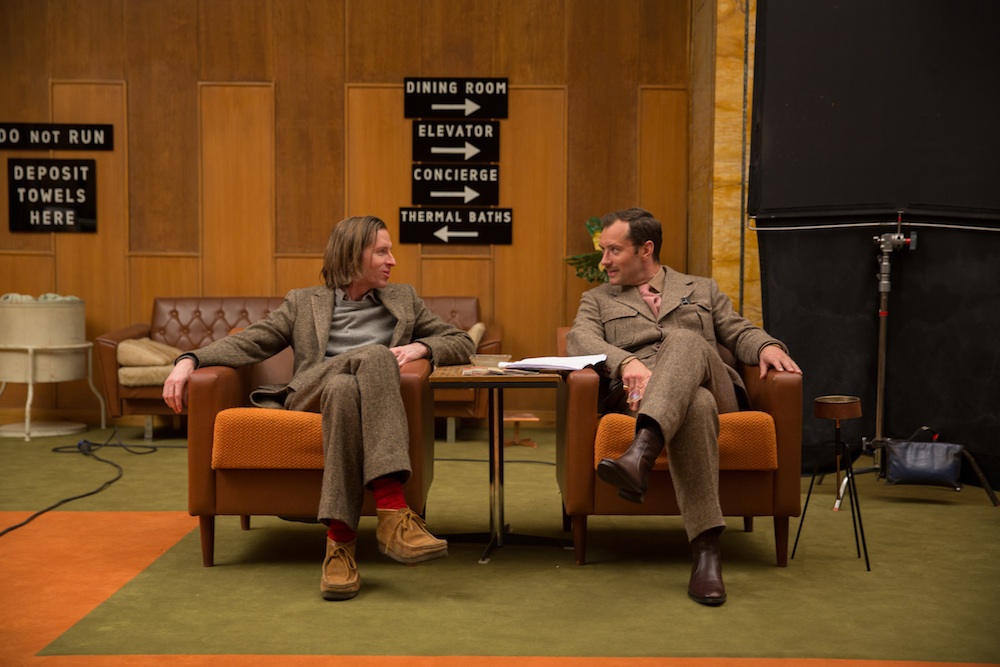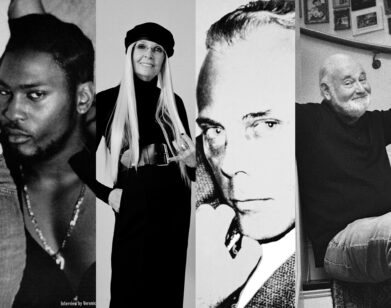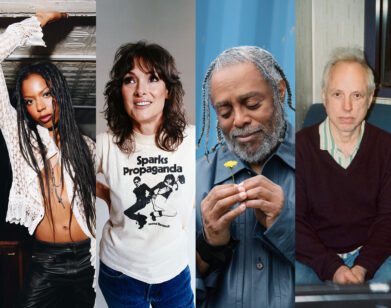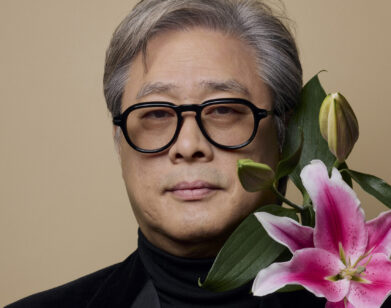Wes Anderson’s European Adventure

ABOVE: WES ANDERSON (LEFT) AND JUDE LAW ON THE SET OF THE GRAND BUDAPEST HOTEL. PHOTO COURTESY OF FOX SEARCHLIGHT.
The Grand Budapest Hotel is writer-director Wes Anderson’s most ambitious project to date. A transcontinental romp set in the fictional Republic of Zubrowka, and filmed on location in Germany, the film opened the Berlin Film Festival last month, where it won the Jury Grand Prix Silver Bear.
Anderson’s signature visual style (each precisely detailed frame could be a painting) and trademark tone (arch, droll, deadpan irony) converge in a whimsical, zany caper comedy, set largely in 1932. Ralph Fiennes, Jude Law, F. Murray Abraham, Harvey Keitel and Saoirse Ronan join the troupe of merry pranksters who have inhabited Anderson’s previous films, including Adrien Brody, Willem Dafoe, Jeff Goldblum, Edward Norton, Bill Murray, Jason Schwartzman, Owen Wilson, Tilda Swinton, Waris Ahluwalia, and Bob Balaban.
The film tells the story of Monsieur Gustave (Fiennes), the belle époque Hotel’s suave and highly refined concierge, prone to speaking in verbal flourishes and curlicues. Falsely imprisoned for the murder of the 84-yr-old dowager Madame D (Swinton), Gustave escapes jail (digging tools having been cleverly smuggled in delectable pastries) and traverses the Alps on skis, sleds, trains, cable cars, and motorcycles, with law enforcement and the nefarious, brass-knuckle-wielding Jopling (Dafoe) in hot pursuit. Along the way, Gustave instructs his protégé, a lobby boy named Zero Moustafa (Tony Revolori) in matters of the heart and guest hospitality, before being rescued in an impeccable set piece by the Society of the Crossed Keys, a fraternity of the Continent’s greatest concierges (Murray, Wilson, Ahluwalia, Schwartzman, and Balaban).
Fiennes’ character was inspired by the early 20th century Viennese writer Stefan Zweig, a dandy consumed with romantic dalliances, café-sitting, and globe-trotting. Zweig wore alligator shoes, wrote in violet ink, and served liquors sprinkled with gold leaf during salon soirées with his friends Sigmund Freud and Albert Einstein.
During filming, Anderson is known for his many takes and highly detailed preparation. His distinctive whip pans are not random: he came to set with a full animatic of the film, in which he portrayed the voice of each character. Every molecule is informed by the icononclast’s unmistakable wit and akimbo perception of the world.
We recently sat down with the director at the Crosby Hotel in SoHo. Affable and boyish-looking at age 44, Anderson (who often directs while clad in brown corduroy or white linen suits) was dapper in a brown tweed herringbone suit.
LORRAINE CWELICH: How do you establish your tone on set, particularly when working with new actors?
WES ANDERSON: With actors, we’ve got the scene in front of them and I just want them to make it feel real. The scene may be a fantastical sort of thing and it may be a bit surreal or whatever it is, but I just want them to make it feel like it’s really happening. Maybe there are other aspects to it, but that’s the main thing.
CWELICH: You are known for planning the tiniest details of a scene beforehand. Is there room for improv?
ANDERSON: We plan everything very carefully in advance and then once everyone gets there, I always feel it’s chaos! They take over and we do a lot of takes but very quickly, over and over again. We don’t stop between takes, and it becomes a kind of wild energy. I like that. I want to get to a moment where now the thing just needs to happen. And that’s them [the actors].
CWELICH: You asked your actors to watch certain films: Grand Hotel, The Shop Around the Corner, Grand Illusion. How did those films influence The Grand Budapest Hotel?
ANDERSON: For every movie I do, there are lots of other movies that I’m stealing ideas from. With this one, more than anything, were ’30s American movies but also certain European movies—Max Ophüls, Jean Renoir. But the biggest thing was Hollywood ’30s movies, especially made by Eastern and Central European directors who ended up in Hollywood. Certain moments, I think, “I could use the way he did this; that would help me.” For me, filmmakers that I like or movies that I love are full of solutions to problems: how are we going to get this part of our story across? It worked great for this other person; we could do it like that.
CWELICH: How do you blend new actors with your films’ recurring cast of characters?
ANDERSON: I rely on [the regulars] to find their way to make it fresh and new each time. Somebody like Ralph, you go to him because you want a strong collaborator. In the end, he’s in charge of that character; he knows better than anybody else what’s going to be right for him. You can say that about most everybody in this movie—they’re all formidable actors who bring their own whole approach.
CWELICH: How did Stefan Zweig influence you?
ANDERSON: First I read Beware of Pity. I just loved that book from the first page. Then I read some of the short stories and I started to get to know his body of work. I was sort of thinking, maybe I could adapt one of these and then I thought maybe I could do my own version of one of these. Then I read his memoir, The World of Yesterday, which made a very strong impression on me in a different way. It’s his description of Vienna and Europe before 1914 and how the series of changes for him were the slow suicide of this whole culture. I kind of took that and thought that would be part of what our movie will be about. So even though the story in our movie is not really anything to do with Zweig and the main character doesn’t come from Zweig’s work, I feel it’s me trying to do a version of his world.
CWELICH: Tell us about your take on his world.
ANDERSON: For Zweig, the Vienna he was growing up in as a teenager and young man, he called it “the world of security.” Art was the center of everything and the morning paper had poetry and philosophical texts in it. New musical compositions were debuting all the time. Their rock stars were playwrights. They didn’t have passports; their freedom was assumed. That’s how he describes it. [Gustave] is probably more like Zweig himself than the kinds of characters that he wrote. Usually his characters have one particular problem; there is something that is deeply troubling them, something that they’re obsessing about. Gustave is not so much like that. There are many relationships, and he has a sadness about him, but he is not a deeply conflicted person. But Zweig himself might have been something like this character.
CWELICH: The loss of innocence seems to be a recurring theme in many of your films.
ANDERSON: Usually I don’t think about these movies thematically. I like to just think about making an experience for somebody. I’m interested in how other people interpret the film or think about it. But I don’t really want to put my own thoughts about it out there and I don’t want to define or interpret the story because I want it to have enough abstraction or be unconscious, like life.
CWELICH: Growing up, if you hadn’t become a filmmaker, what would have been instead?
ANDERSON: When I was a kid, at one point I wanted to be an architect. And then after a certain point on, I wanted to be a writer. And eventually they both led to this.
CWELICH: How does having lived in Europe, specifically Paris, impact your sensibility in this film?
ANDERSON: The first impact is that it’s the reason why I wanted to do it in the first place. I wanted to do a “Europe movie” in the abstract. Usually the thing I want to do a movie about these days is the thing I’m interested in right then. I had gotten very interested in India at one point [before making The Darjeeling Limited]. I wanted to learn about India and I was interested in some Indian filmmakers, as well as films that had been made in India by foreigners and so I pursued that. In this case, I was interested in what I was seeing where I was living and also what I was reading that had to do with Europe. So even though it has a historical context that we recognize, it’s still very personal to me because I have my own relationship to this world we’re making the story about. Also the character played by Ralph [Fiennes], a big inspiration for him is a real person, a European friend. It comes from things in my own life that I’ve observed.
CWELICH: What’s currently interesting you right now, which you think might lead to your next film?
ANDERSON: I have a very vague idea of what I want to do next and it’s very complicated. Usually I have a couple of books going at once and sometimes I’ve got several books going at once that aren’t really going anywhere [laughing], a bunch of books with a bookmark on page 35, and it’s probably not going to get a lot further. But one thing that I’m right in the middle of at the moment is David Copperfield, which I’ve never read before. What an experience it is reading that book. So who knows? Maybe that will lead somewhere.
THE GRAND BUDAPEST HOTEL COMES OUT THIS FRIDAY, MARCH 7.






